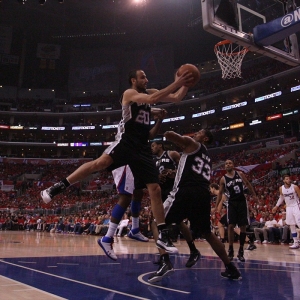
So far in these fairly exciting NBA Playoffs one theme has emerged consistently - lopsided wins in games that you wouldn't expect there to be one. I'm not talking about games in the 1-8 or 2-7 first-round matchups - no one really expects those to be close in much cases. In seven games so far, though, we have seen blowouts in games that we could reasonably have expected to be competitive:
- Miami won Game 1 over Charlotte by 32
- Atlanta beat Boston by 27 in Game 5 of their series
- Oklahoma City beat Dallas by 38 in their first-round opener
- The Thunder thumped the Mavs again in Game 3, winning by 29
- The Clippers won Game 1 by 20 and Game 2 by 21 against the Trail Blazers
- San Antonio crushed the Thunder by 32 in their opener to start Round 2
That is a lot of games that were over well before the final buzzer. So, why? And what does it mean for bettors? Are there lessons we can learn here? Let's take a look:
The wins are largely a sign of the bigger picture
Miami won big in Game 1 of their series against Charlotte and eventually won the series. It wasn't easy, and it took seven games, but the best team in the first game was ultimately the best team in the series. Atlanta won Game 5 big, and they won the series in six games. It's almost as if Boston realized at that moment that it wasn't going to happen for them. Oklahoma City won those two games very easily and ultimately won the series easily in five games. They dominated in large part because they were the dominant team.The Spurs won their opener big in the second round, and are strong favorites in the series. The only exception is the Clippers, but they aren't particularly relevant - losing both Chris Paul and Blake Griffin to injury doomed them in that series. So, the first conclusion that we can draw isn't necessarily a groundbreaking one, but it still can be useful as a reminder if nothing else - the team that wins by a blowout is probably the better team in the matchup. So don't try to outthink yourselves.
Momentum doesn't necessarily carry over
Miami won their first game huge, won the second one comfortably, and then lost three straight. The early dominance wasn't a knockout punch. In between the two dominant wins by Oklahoma City was a Dallas win - an ugly win, but still a win. The Thunder clearly seemed to let off the gas after the early success. The Clippers won handily in the opening two and then dropped four straight. Injuries can't account for all of that absence of momentum. After the Spurs dominated the opener they lost the second game to Oklahoma City at home - albeit in wildly-controversial style in the final seconds. Only Atlanta was able to ride their dominance to success without a hiccup along the way - they won the fifth and final game of the series by 12 on the road. Add it all up and we get this: while it seems reasonable to assume that the blowout team is likely the best team, it doesn't mean that they are going to be the best team every night. Every game is an individual entity. It's just as the sample size gets bigger that the superiority of one team is more likely to emerge. In other words, anything can happen on any given night - regardless of what has happened the game before.
Home cooking tastes better
All but one of these blowouts - the second win by the Thunder over the Mavs - happened on home courts. The home-court advantage in the NBA is significant and obvious. This is just a good reminder for us - the better team in a series is even better on their own court.
You can't see them coming
In each of these cases I would fully accept someone telling me that they knew that the team that won was going to win, and even that they were going to cover the spread. What I wouldn't accept at all, though, is anyone in any of these cases, except maybe Oklahoma City and Dallas, telling me that they knew that these particular games were going to be lopsided. A game turning out like this requires so many independent factors to fall into place - a disparity in shooting effectiveness, officiating that works better for one team than the other, breaks going their way, coaches and players making or not making optimal decisions when needed, and so on. If you are seeing blowouts as likely in reasonably-matched series then you are probably stretching - and that's a bad way to find value over the long term. These situations are somewhat instructive to learn from after the fact, but trying to predict them is a mug's game.
Read more articles by Trevor Whenham
Most Recent NBA Handicapping
- NBA Betting: Atlanta Hawks Season Long Handicapping 1/2/2026 vs. New York Knicks
- NBA Betting: Atlanta Hawks Season Long Handicapping 12/31/2025 vs. Minnesota Timberwolves
- NBA Betting Trends Analysis and Expert Handicapping 12/31/2025
- NBA Betting: Atlanta Hawks Season Long Handicapping 12/29/2025 vs. Oklahoma City Thunder
- NBA Betting Tutorials, Best of Lists, Top Articles from Experts
- NBA Players Who Transformed Their Career After a Trade
- NBA Betting: Atlanta Hawks Season Long Handicapping 12/26/2025 vs. Miami Heat
- Top 5 NBA Players Who Should’ve Stayed With Their Original Team
- NBA Betting: Atlanta Hawks Season Long Handicapping 12/23/2025 vs. Chicago Bulls
- NBA Betting Trends Analysis and Expert Handicapping 12/22/2025
